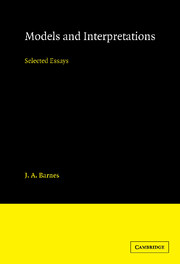Book contents
- Frontmatter
- Contents
- Preface
- Acknowledgments
- Introduction: social science in practice
- I MODELS OF THE REAL SOCIAL WORLD
- 1 Genetrix: genitor:: nature: culture? (1973g)
- 2 African models in the New Guinea highlands (1962a)
- 3 Agnatic taxonomies and stochastic variation (1971n)
- 4 Class and committees in a Norwegian island parish (1954a)
- 5 The righthand and lefthand kingdoms of God: a dilemma of Pietist politics (1971k)
- 6 Indigenous politics and colonial administration, with special reference to Australia (1960a)
- 7 The perception of history in a plural society: a study of an Ngoni group in Northern Rhodesia (1951c)
- II MODELS OF SOCIAL SCIENCE
- III A MODEL OF MODELLING
- Postscript: structural amnesia (1947: 52–3)
- Bibliography
- Index
6 - Indigenous politics and colonial administration, with special reference to Australia (1960a)
Published online by Cambridge University Press: 08 January 2010
- Frontmatter
- Contents
- Preface
- Acknowledgments
- Introduction: social science in practice
- I MODELS OF THE REAL SOCIAL WORLD
- 1 Genetrix: genitor:: nature: culture? (1973g)
- 2 African models in the New Guinea highlands (1962a)
- 3 Agnatic taxonomies and stochastic variation (1971n)
- 4 Class and committees in a Norwegian island parish (1954a)
- 5 The righthand and lefthand kingdoms of God: a dilemma of Pietist politics (1971k)
- 6 Indigenous politics and colonial administration, with special reference to Australia (1960a)
- 7 The perception of history in a plural society: a study of an Ngoni group in Northern Rhodesia (1951c)
- II MODELS OF SOCIAL SCIENCE
- III A MODEL OF MODELLING
- Postscript: structural amnesia (1947: 52–3)
- Bibliography
- Index
Summary
So far, we have been concerned in these chapters with social institutions existing within a comparatively homogeneous society. We have progressed from the face-to-face relations of kinship, through the somewhat largerscale relations with lineages and between residents in a rural local area, to those found between national political actors. Despite the variations in scale, all these systems of relations have involved aggregations of people who, despite differences in allegiance, have nevertheless shared a broadly specified common culture. In the next two chapters we move on to consider models spanning more than a single society and characterized by cultural heterogeniety and inequalities in power and resources. Both the chapters deal with aspects of colonialism.
My first experience of colonialism was in central Africa, in what were then the British protectorates of Northern Rhodesia and Nyasaland, now Zambia and Malawi. My Oxford doctoral dissertation was a study in the conquest of an African tribe and its incorporation into a colonial regime (Barnes 1967j). My understanding of colonialism had been deepened through contact in London with Keith Hancock, and I was impressed with his treatment of colonial frontiers in his Survey of British Commonwealth affairs (1937–42). At a conference on race relations in 1954 I presented a model of colonial expansion and consolidation based on evidence from throughout southern Africa (Barnes 1955e). […]
- Type
- Chapter
- Information
- Models and InterpretationsSelected Essays, pp. 103 - 119Publisher: Cambridge University PressPrint publication year: 1990



